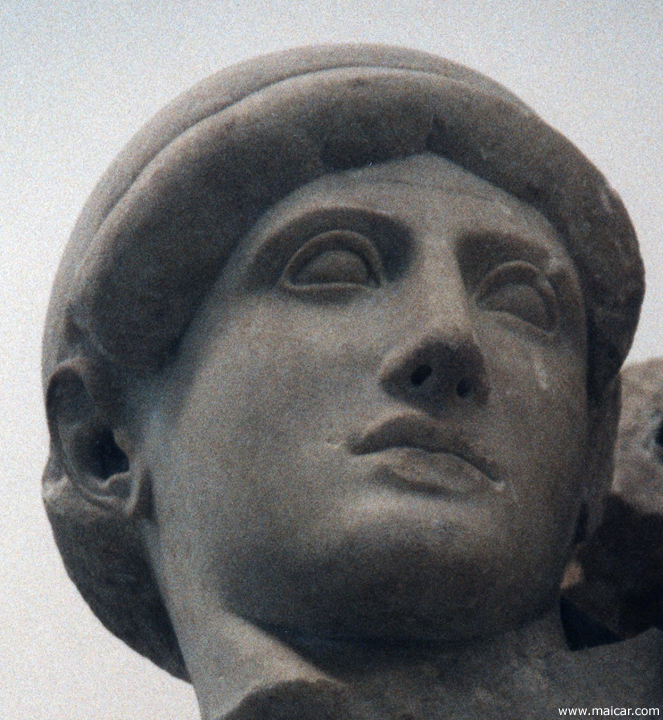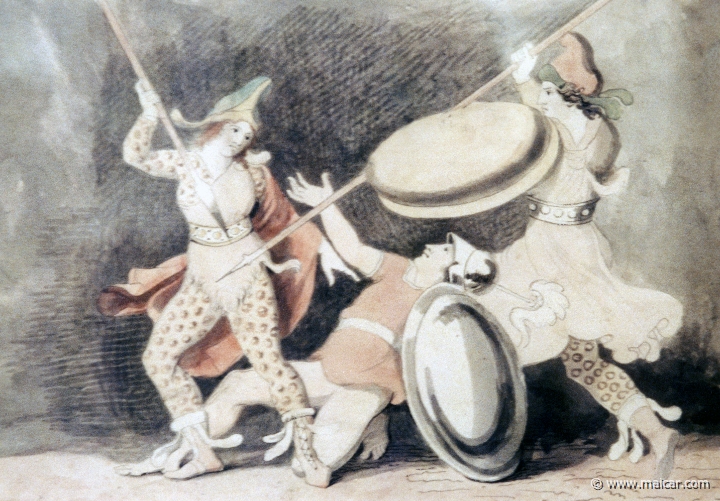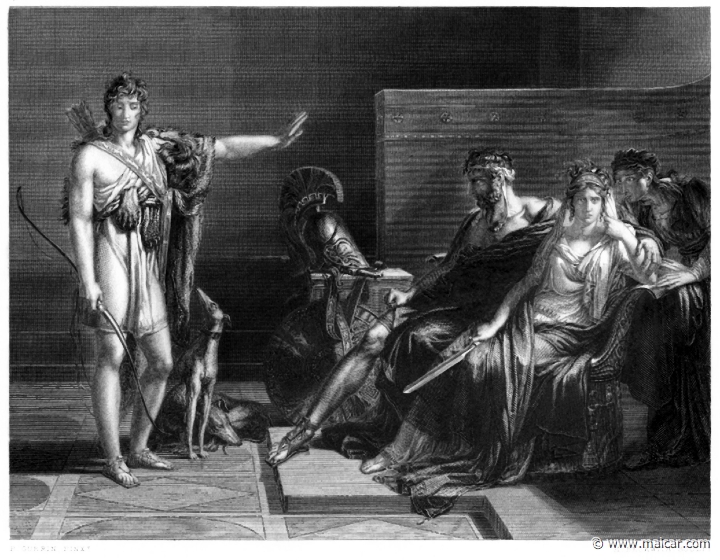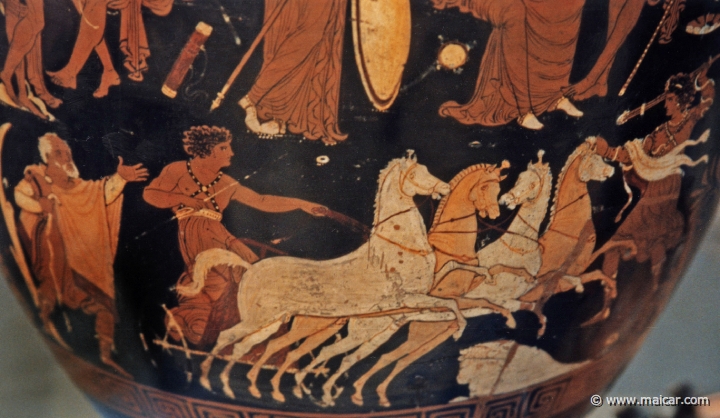|

|
6719: Theseus. West Pediment of the Temple of Zeus at Olympia, c. 460 BC. Archaeological Museum, Olympia.
|
|
Phaedra married King Theseus of Athens and gave him two sons; but she also fell in love with her stepson Hippolytus 4. Since he refused her, and her passion for him became known, she hanged herself, leaving a letter in which she charged her stepson of having assaulted her. This happened in Troezen, say some, or in Athens, say others.
The Amazon, Theseus,
and Phaedra
Having joined Heracles 1 in his expedition against the AMAZONS, Theseus brought back
captive to Athens either Antiope 4 or Hippolyte 3. Although one of these women bore him a son Hippolytus 4, he nevertheless married Phaedra, whom he received from her brother Deucalion 2—son of King Minos 2 of Crete and his successor—who thus wished to seal the friendship between the two countries, and form an alliance between Crete and Athens. Yet some say that Theseus killed Deucalion 2, and crushed his bones when he was in Crete. And it is also told
that before returning to Athens, Theseus abandoned at the
mercy of wild beasts Phaedra's sister Ariadne, whom he had
taken with him promising her marriage.
Conflict with the Amazon
In any case, it is told that when the wedding of Theseus and Phaedra was
being celebrated, a troop of AMAZONS, led by her who
had before married Theseus, appeared in
front of the guests, threatening to kill everybody.
But as they say, the doors were closed and she was
killed, who, according to others was never married
to Theseus, Hippolytus 4 being Theseus' bastard son by her. Others affirm that the AMAZONS, being assisted
by forces from Scythia,
marched against Athens in
order to punish Theseus,
who had enslaved their leader. This army is said to
have assembled in the northern coast of the Black
Sea, and descending through Thrace and northern
Hellas, came to Attica, taking position on the
slopes of the Areopagus, in the place later called
Amazoneum. In the battle than ensued, Theseus, with her wife the Amazon Antiope 4 fighting on his side, defeated the invaders and drove them out of the country. It was then, they say, that the AMAZONS of Thermodon in Asia Minor, renounced their own soil, making their homes among the Scythians. Antiope 4, some assert, was killed in battle by the Amazon Molpadia 1.
|

|
Fighting AMAZONS. 3725: Johann Heinrich Wilhelm Tischbein, 1751-1829: Kämpfende Amazonen 1795. Landesmuseum Oldenburg, Das Schloß.
|
|
In love with her stepson
After Phaedra had given birth to two sons, she fell in love with her stepson Hippolytus 4, the son of the Amazon, and this is the reason why she erected a temple of Aphrodite beside the
Acropolis, on the spot when Troezen can be seen across the water. For Hippolytus 4 lived at Troezen, where he was
being reared by Pittheus, since Theseus neither wished
him to be the subject of his children by Phaedra
nor king in their stead. For this reason, they say, Theseus' father in law
was in charge of the young man, bringing him up to
be the future king of Troezen, which at the
time was subject to Athens.
What happened in a nutshell
Phaedra and Theseus visited that city from time to time, and it was during one of these visits that she asked Hippolytus 4 to lie with her. Others say that Theseus and Phaedra were
self-exiled in Troezen on account of the death of the Pallantides, a
faction that revolted against Theseus, being violently repressed by him. Hippolytus 4, who worshipping Artemis kept himself
chaste (although some say that he hated all women),
rejected Phaedra. But on her return to Athens, she told her
husband that her stepson had proposed lying with
her. Theseus then decided to put his son to the test, and Phaedra, fearing the result of that interrogation, hanged herself. Hippolytus 4 was so upset when he heard the accusation that he lost control over the chariot he was driving—which was smashed to bits—being himself entangled in the thongs and dragged along to death. Others affirm that Theseus believed
Phaedra's accusation, and prayed to his own father Poseidon that Hippolytus 4 might perish. The god then, hearing his prayers, sent up a bull from the surf when the young man was driving his chariot by the sea, and when the horses were frightened, the chariot dashed in pieces, and Hippolytus 4 was entangled in the reins and dragged to death.
The nurse's good intentions
It has also been told that Phaedra, who until then had just gazed upon him from a certain hidden spot when he practised his exercises, hanged herself when her passion was made public. Or rather when she learned that her nurse, in order to serve her, had dared to talk to Hippolytus 4 about her passion for him without her permission.
|

|
The image summarizes the passions playing upon the characters: the rejection and denial of Hippolytus 4, the suspicion and jealousy of Theseus, and the despair and shame of Phaedra. The gossipy nurse is behind her. print011: Engraving after a painting (1802) by Pierre-Narcisse Guérin 1774-1833: Phaedra and Hippolytus.
|
|
Ideas of Hippolytus 4
This young man regarded what he had heard from
the nurse as a criminal proposal, and threatened,
to her despair, to spit her word out. Her shameless
confession proved to him—once more—that
women are a curse to the human race; for he already
believed that it would have been a much better
heavenly plan to let men buy their sons from the
gods, paying their weight in bronze, iron, or gold.
For marriage, he believed, consists in supporting a
stranger, who usually squanders the family fortune,
spending in gowns and other beautiful things that
she heaps on her hatefulness. And the more clever
the woman, the worse, he thought; for according to
him, the sexual urge breeds wickedness more readily
in clever women.
The nurse before Phaedra
Despite all this, Hippolytus 4 promised the nurse not to repeat what she had told him. But when Phaedra learned about her nurse's adventures, the least she said was:
"Did I not
guess what you intended, and forbid you speak one
word of what now drags me in the dirt?" (Phaedra to her nurse. Euripides, Hippolytus 684).
And when the nurse attempted to explain herself
...
"I tried to
find a remedy for your sickness ... If I had
succeeded, everyone would have reckoned me a wise
woman. They call it wisdom when we happen to guess
right." (Phaedra's nurse to Phaedra. Euripides, Hippolytus 700).
... Phaedra dismissed her:
"You think
this fair ... wound me to death, then word me in
this magnanimous tone... You gave me bad advice
before and wicked help. Out of my sight!" (Phaedra to her nurse. Euripides, Hippolytus 706).
End of Phaedra and Hippolytus 4
|

|
Hippolytus 4 drives his chariot. Poseidon's bull can be seen beneath the horses. 8220: Red-figured volute-krater (bowl for mixing wine and water) with two zones of decoration. Hippolytus. Apulia c. 340 BC. British Museum, London.
|
|
After this unfriendly encounter with her nurse, Phaedra found a way to cure her ill by killing herself. Such was the end of Phaedra, who called Aphrodite her
destroyer, and came to think that Love is merciless. But in
order to save her memory and reputation, she left a
letter to Theseus, accusing Hippolytus 4 of having with violence entered her bed. When Theseus reproached Hippolytus 4, the latter swore innocence, but his father accepted no oath, and banished him from Troezen, not only
unjudged, but also cursed:
"... Father Poseidon, since you promised me three
curses, with one of them now strike down my son! If
they were valid curses that you gave me then, let
my son not escape his fate to this day's
end!" (Theseus to Poseidon. Euripides, Hippolytus 889).
And the god granted. For when Hippolytus 4 left Troezen and was in his
way to Argos, the bull
appeared that Poseidon sent from the waves, causing the horses of his chariot to be seized by terror, and the driver—tangled in the reins—to be dashed against the rocks. That was the end of Hippolytus 4, but Theseus' behavior
towards his son was not forgotten. For it is said
that more than twelve hundred years after these
events the following dialogue took place in a Roman
prison:
Arcadian youth: "I shall be put to death; for by
our latter-day laws self-respect is honoured with
capital punishment."
Apollonius: "So it was in the
time of Theseus, for Hippolytus was murdered by
his own sire for the same reason." (Flavius Philostratus, Life
of Apollonius of Tyana 7.42).
|